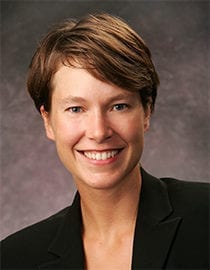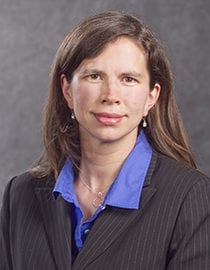
By Andrew Cohen
Andrea Roth has come to expect the exceptional from Molly Van Houweling, her fellow Berkeley Law professor and the school’s associate dean for J.D. curriculum and teaching.

When the COVID-19 pandemic sparked panic and turned educational practices upside down, Roth watched her colleague calmly spring into action. Facilitating workshops, resource pages, FAQs, troubleshooting guides, and happy hours focused on excellence in remote instruction, Van Houweling coordinated the efforts of faculty members as well as instructional technology, media services, and curriculum staff in teaching over 1,000 diverse law students with diverse needs.
For those herculean efforts, she recently won UC Berkeley’s new Extraordinary Teaching in Extraordinary Times award, one of 43 recipients from over 500 nominations.
“Molly created an atmosphere of hope and normalcy even in such a challenging time,” Roth says. “I guess that’s not surprising, coming from someone who’s not only a great teacher herself but a leading copyright scholar and an athlete who until recently held the women’s world record for bicycling distance in an hour. Still, even given her superhuman status, she got us to find unexpected joy, humor, and insight in remote teaching and led us back into the light.”

Several members of the Berkeley Law community nominated Van Houweling. They noted how her tireless work goes beyond her job description to help the school not only maintain its stellar instruction level, — but actually emerge stronger because of new technical, classroom, and assessment techniques that can translate back to in-person learning.
The same week Berkeley Law’s shelter-in-place began on March 10, 2020, Van Houweling hosted a Zoom instructional meeting, broadly disseminated information on teaching via Zoom — including tips gleaned from an early informal survey of people who had used it — and worked with the instructional technology department to create a remote teaching website with copious information.
Professor Saira Mohamed calls these efforts “extraordinarily helpful not only because I learned so many tips and good practices from them, but because at the core of every program seemed to be a foundation of empathy, humility, and understanding.”
Van Houweling also sent daily emails with encouragement and advice on remote teaching and take-home exams. She capped the week with another Zoom happy hour to bolster morale and share information.
The following week, Van Houweling surveyed faculty and students to learn what was and wasn’t working, culminating in a list of remote teaching do’s and don’ts when they returned from spring break that was updated through the summer. During the summer and fall, she also conducted a regular series of remote teaching workshops.

“Molly has been not only a guide, but also an example,” Mohamed says. “Although this award is for extraordinary times, everything she has been doing in this extraordinary time is consistent with the work she was doing in ‘ordinary’ times.”
Pedal down
A Berkeley Law faculty member since 2005 and a leading intellectual property expert, Van Houweling is an associate reporter on the American Law Institute’s Restatement of the Law of Copyright and an adviser to the Restatement of the Law of Property. She also chairs the board of directors at Creative Commons, and is a founding director of Authors Alliance.
“Enthusiastic and interactive,” she says in describing her own teaching style. “I don’t know the answer to everything — no one does. But almost everything my students are curious about, I’m curious about too. So I enjoy exploring difficult-to-answer questions together with them.”
As for the challenges of doing that consistently well on Zoom, she knows it’s harder to detect signs a student may be struggling, bored, or distracted. Van Houweling has adjusted her teaching style as a result, pausing more for student questions.
“There are several students I met in person last year whom I feel I’ve gotten to know much better through these closeup face-to-face virtual interactions,” she says. “And there are 1Ls I’ve never met in person at but feel like I know well already. Much of this happens in the virtual classroom, but I’ve also been hosting virtual lunches and a virtual craft hour to provide more casual environments in which to chat about law school and life. Being accessible and helpful to students is a core part of my job, and it’s also what makes the job worth doing.”

Andrew Albright, a first-year student in her Property course, appreciates that personal investment — and teaching acumen. He says Van Houweling regularly makes concepts “incredibly understandable” and not only teaches the doctrine, “but also what interests the doctrine is intended to serve.”
Once in class, Albright asked about a concept he didn’t fully grasp. “Instead of simply answering the question, Professor Van Houweling used that moment as an opportunity to give me praise for pointing out a shortcoming in the doctrine,” he says. “She never misses a beat to empower students in their own learning objectives and to turn confusion into learning.”
Albright notes how she deftly uses on-call panels, the Socratic method, Zoom polls, and breakout rooms to engage students in varied ways, as well as online discussion boards for students to continue class discussions or post articles related to topics covered in class.
“She’s also always available in office hours to discuss the class, or anything else that’s on our minds,” he says. “Overall, she has taken a very challenging situation — Zoom + 1L — and found ways to engage all of us.”
Van Houweling has also moved her cycling to the virtual realm on a platform called Zwift. There’s a clear metaphor with teaching, which she says “is like a perpetual motion machine … you put a lot of energy in, but you get more energy out thanks to the students.”